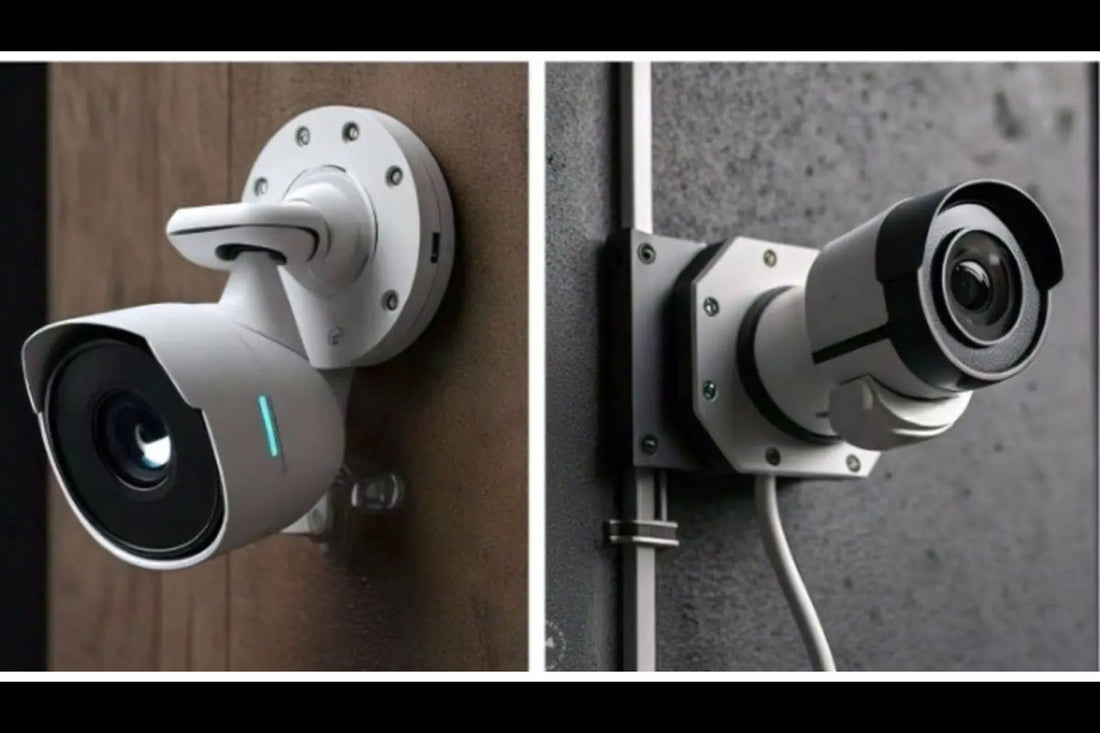
Wired vs Wireless CCTV camera : What’s Really Better for Your Property?
Share
![]() Making the Right Choice: Wired or Wireless CCTV Systems?
Making the Right Choice: Wired or Wireless CCTV Systems?
In an increasingly security-conscious world, Closed-Circuit Television (CCTV) cameras have become essential for safeguarding homes, businesses, and public spaces. One of the first decisions you’ll need to make when installing a CCTV system is choosing between wired and wireless cameras. Both types have their strengths and limitations, and the right choice depends on your specific security needs, budget, and installation environment.
This blog explores the key differences between wired and wireless CCTV cameras to help you make an informed decision.
What Are Wired CCTV Cameras?
Wired CCTV cameras use physical cables to transmit video and audio signals to a recording device (usually a DVR or NVR). These cameras also often rely on cables for power, although some setups use Power over Ethernet (PoE), which allows a single cable to deliver both power and data.
✅ Pros of Wired CCTV Cameras
1. Stable Connection
Since they use physical connections, wired cameras provide a consistent and uninterrupted signal without interference from other devices or Wi-Fi congestion.
2. Better for Large Installations
Ideal for commercial buildings or large properties where long-range transmission is required.
3. High-Quality Video Feed
Wired systems typically offer better image quality due to the higher bandwidth.
4. Reliable Power Supply
Constant power connection reduces the risk of downtime.
❌ Cons of Wired CCTV Cameras
1. Complex Installation
Requires drilling, cabling, and potentially professional help, making installation time-consuming and costly.
2. Limited Flexibility
Once installed, relocating cameras is difficult without rerouting cables.
3. Vulnerable to Physical Damage
If the cables are cut or damaged, the system may fail.
What Are Wireless CCTV Cameras?
Wireless CCTV cameras transmit video and audio signals over Wi-Fi or other wireless networks. They are powered either by batteries or a power adapter connected to a nearby socket. These systems usually connect to a cloud-based service or local storage via Wi-Fi.
✅ Pros of Wireless CCTV Cameras
1. Easy Installation
No need to run cables through walls—great for DIY enthusiasts.
2. Flexible Placement
Cameras can be easily moved or repositioned as long as they’re within Wi-Fi range and have access to power.
3. Remote Access
Most wireless systems come with apps for live monitoring and playback from anywhere with an internet connection.
4. Aesthetically Pleasing
Minimal wiring makes for a cleaner, less intrusive setup.
❌ Cons of Wireless CCTV Cameras
1. Signal Interference
Wi-Fi connections can be disrupted by walls, electronics, or other wireless devices, impacting video quality or connectivity.
2. Dependent on Network Stability
If your Wi-Fi goes down, so does your surveillance system.
3. Limited Range
Wireless cameras are usually effective only within a certain distance of the router.
4. Battery Maintenance (if battery-powered)
Requires regular battery checks and replacements if not hardwired for power.
Comparison Table: Wired vs Wireless CCTV
| Feature | Wired CCTV | Wireless CCTV |
|---|---|---|
| Installation | Complex, needs cabling | Easy, minimal setup |
| Signal Reliability | Very stable | Prone to interference |
| Video Quality | Generally higher | May vary with Wi-Fi |
| Flexibility | Limited | Highly flexible |
| Power Supply | Constant (wired) | Battery or adapter |
| Maintenance | Low | Moderate (batteries, connectivity) |
| Cost | Higher upfront (install) | Lower initial cost |
| Ideal For | Large, permanent setups | Homes, rentals, small offices |
Use Case Scenarios
Choose Wired CCTV if:
• You’re securing a large property or commercial facility.
• Long-term reliability is a priority.
• You can afford professional installation.
• You want high-resolution, uninterrupted video.
Choose Wireless CCTV if:
• You live in a rental or plan to move soon.
• You need a quick and easy DIY installation.
• You prefer accessing footage via smartphone apps.
• Your Wi-Fi connection is strong and stable.
Conclusion
The choice between wired and wireless CCTV cameras boils down to your priorities:
• If you prioritize performance and reliability, and you're securing a larger area, wired systems are the better choice.
• If you want flexibility, ease of installation, and remote access features in a small to medium space, wireless cameras are the way to go.
In some cases, a hybrid system—combining both wired and wireless cameras—might be the perfect solution for comprehensive coverage.
